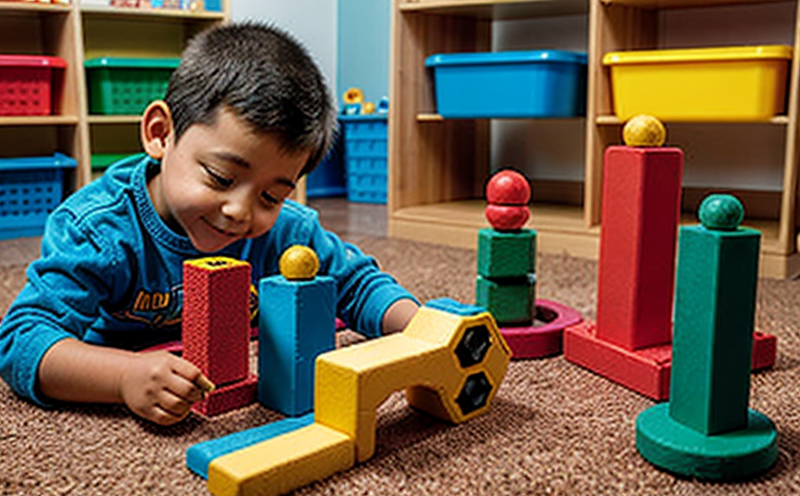Testing the ability of materials in toys to withstand bending without breaking or cracking
The Crucial Role of Material Flexibility Testing in Ensuring Toy Safety Why Eurolabs Expertise Matters
As a parent, theres nothing more reassuring than knowing that the toys your child plays with are safe and durable. However, ensuring the safety and durability of toys can be a daunting task for manufacturers and regulatory bodies alike. One critical aspect of toy testing is evaluating the materials ability to withstand bending without breaking or cracking a service provided by Eurolab, a leading laboratory in the industry.
What is Material Flexibility Testing?
Material flexibility testing, also known as bending tests or flexural tests, assesses the ability of materials in toys to absorb and distribute stress without failing. This type of testing simulates real-world scenarios where children might accidentally drop or bend their toys, helping manufacturers identify potential weak points and take corrective measures.
Why is Material Flexibility Testing Essential for Businesses?
In todays highly competitive toy market, manufacturers must ensure that their products meet rigorous safety standards while also delivering a premium experience. Conducting material flexibility tests helps businesses in several ways
Key Benefits of Using Eurolabs Material Flexibility Testing Services
Enhance Safety By identifying potential weak points in materials, manufacturers can redesign and retest their products to prevent accidents and injuries.
Reduce Recall Costs A proactive approach to testing can help companies avoid costly product recalls due to material failures.
Comply with Regulations Conducting regular flexibility tests ensures that toys meet or exceed industry standards for safety and performance.
Increase Customer Trust When manufacturers demonstrate a commitment to safety through rigorous testing, they build trust with consumers, driving sales and loyalty.
How Does Eurolabs Material Flexibility Testing Service Work?
At Eurolab, our team of experts utilizes state-of-the-art equipment and time-tested methods to conduct comprehensive material flexibility tests. Our services include
Customized Test Protocols We work closely with clients to develop tailored testing plans that meet their specific needs.
Advanced Equipment Leverage the latest technology in materials science, including universal testing machines (UTM) and precision instruments.
Expert Analysis Our experienced engineers provide detailed reports on test results, highlighting areas for improvement.
Common Questions About Material Flexibility Testing Answered
Q What types of toys require material flexibility testing?
A Toys made from a variety of materials, including plastics, woods, metals, and composites.
Q How often should manufacturers conduct material flexibility tests?
A Regular testing is recommended, ideally during product development stages to ensure ongoing safety and performance.
Q Can Eurolabs services help with regulatory compliance?
A Absolutely our team is well-versed in industry standards and can assist clients in meeting or exceeding requirements.
Q What kind of data can I expect from the testing process?
A Our comprehensive reports provide detailed information on material properties, including flexural strength, modulus, and failure modes.
Making an Informed Decision with Eurolab
When it comes to ensuring toy safety and durability, manufacturers rely on trusted partners like Eurolab. By leveraging our expertise in material flexibility testing, businesses can
Mitigate Risk Identify potential weak points and take corrective action before product launch.
Gain Competitive Advantage Demonstrate a commitment to safety through rigorous testing, differentiating themselves from competitors.
Drive Innovation Collaborate with our team to develop new materials or designs that meet evolving market demands.
In the world of toy manufacturing, material flexibility testing is no longer a nicety its a necessity. Partner with Eurolab today and take the first step towards safer, more durable toys that delight children while reassuring parents.
About Eurolab
Eurolab is a leading laboratory specializing in materials science and safety testing for various industries, including toy manufacturing. Our team of experts offers customized services tailored to meet each clients unique needs, from initial product development to ongoing quality control.
Stay ahead of the curve with Eurolab where innovation meets expertise.
-
Evaluating the structural integrity of toys under bending stress, ensuring that they do not deform easily
-
Simulating real-world play to assess whether toys with flexible parts maintain their shape after bending
-
Ensuring that toys with bendable features, such as soft plastic or rubber parts, resist permanent deformation
-
Verifying the strength of toy components, such as limbs, joints, or handles, against excessive bending forces
-
Testing materials used in toys to ensure they have adequate flexibility while maintaining durability
-
Ensuring that toys with elastic or flexible components do not break when bent or twisted during play
-
Testing whether toys retain their functionality after being bent or deformed during typical usage
-
Verifying that toys designed for bending or flexing return to their original shape after being manipulated
-
Ensuring that toys with materials such as foam, plastic, or rubber remain intact when subjected to bending forces
-
Simulating the repeated bending or flexing of toys to test long-term durability and resistance to wear
-
Testing the bending strength of toys designed for older children to ensure they can handle more intense play
-
Verifying that toys with multiple bendable parts do not weaken or break under repeated play
-
Testing toys with adjustable parts to ensure their bending points remain functional over time
-
Ensuring that the toy’s design maintains strength in areas likely to experience bending forces, like handles or limbs
-
Verifying that bending does not affect the safety or usability of toys, particularly those with sharp or moving parts
-
Testing for durability in toys that require bending or compression as part of their interactive features
-
Assessing toys for any potential risk of injury from sharp bends that could create hazardous edges
-
Ensuring that the materials used in toys can handle sudden or extreme bending without failure
-
Verifying that toys with soft materials or stuffing do not lose their shape after bending or pressing
-
Testing toys with reinforced parts to ensure they do not break under bending or twisting pressure
-
Ensuring that toys with moveable or flexible features provide enough resistance to bending without loss of form




